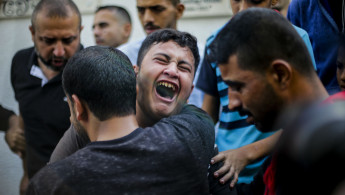Fragile Gaza ceasefire takes hold after Israeli airstrikes kill 34 Palestinians
No one immediately claimed responsibility for the new wave of rockets and it wasn't clear how this would affect the fate of the ceasefire.
Israel had hailed the Gaza operation as a victory, defending its policy of targeting militants in their homes despite civilian deaths and vowed to continue the tactic.
Islamic Jihad said it had succeeded in getting Israel to agree to a ceasefire based on several demands, including a halt to Israeli targeted killings of the group's leaders.
Islamic Jihad spokesman Musab al-Berim said the Egyptian-brokered deal went into effect at 5:30 a.m. An Israeli military spokesman tweeted that the Gaza operation "is over."
Some restrictions were lifted on residents of southern Israel and traffic returned to the streets of the Palestinian coastal territory.
But after hours of calm, a barrage of rockets blasted out of the territory, setting off air raid sirens in southern Israel and testing the fragile truce.
Assassination
The fighting first erupted early on Tuesday after Israel killed a senior commander of the Iranian-backed militant group who was said to be behind a string of rocket attacks and who Israel said was believed to be planning a cross-border infiltration.
The assassination sparked the heaviest fighting with Gaza militants since May. Islamic Jihad fired some 450 rockets toward Israel, while Israel responded with scores of airstrikes.
Gaza's ruling Hamas militant group, much larger and more powerful than Islamic Jihad, stayed out of the latest escalation - an indication it would be brief.
Israel typically does not publicly acknowledge deals with militant groups, and on Thursday officials said the only unwritten agreement was that Israel would hold fire so long as Islamic Jihad did.
Israel's military spokesmen listed a series of accomplishments after the two-day spasm of violence, including the killing of some 25 militants in targeted strikes.
Israeli Foreign Minister Israel Katz said the policy had "proved itself" and would continue. "Everyone who was a top military official, who was set to carry out and was involved in terror or rocket firing against Israel was eliminated," he told Israeli Army Radio. "And we intend to continue with this."
Critics of Israel's contentious policy say it amounts to extrajudicial killings that endanger civilians.
Palestinian officials say 34 people were killed in the fighting, including at least 18 militants. They say eight children, including a pair of 7-year-olds, and three women were among the dead.
Al-Berim, the Islamic Jihad spokesman, lauded the group's efforts against Israel, saying it "had its word, confronted the aggression," and "defended the Palestinian people."
Shortly after al-Berim's cease-fire announcement, two rockets were fired out of Gaza, setting off sirens in southern Israel. It was not immediately clear whether the launches were intentional or misfires caused by electronic timers.
Read more: Israel security minister threatens to assassinate more Palestinian 'enemies'
Islamic Jihad said the fire was likely because word hadn't spread to all members about the halt to violence.
The Israeli military's Home Front command tweeted that it was lifting restrictions in certain areas but leaving them in place in the areas surrounding Gaza.
Late on Wednesday, Islamic Jihad's leader, Ziad al-Nakhalah, announced three conditions for an end to the fighting: an end to targeted killings, a halt in Israeli shootings of protesters at weekly demonstrations along the Israeli border and easing a 12-year-old Israeli blockade that has devastated Gaza's economy.
Israel imposed the blockade after Hamas seized control of Gaza in 2007 from the internationally backed Palestinian Authority. Israel considers Hamas and Islamic Jihad to be terrorist groups.
Broader tensions
The killing of Islamic Jihad's Bahaa Abu el-Atta on Tuesday coincided with a strike in the Syrian capital of Damascus that targeted another Islamic Jihad commander.
Israel hasn't claimed responsibility for that attack and the commander was not killed, but the strikes stepped up Israel's regional conflict with Iran and its proxies.
Israel often strikes Iranian interests in Syria and the fresh fighting looked to awaken Israel's increasingly open conflict with Iran and its proxies in the region.
Iran supplies Islamic Jihad with training, expertise and money. Although its base is Gaza, Islamic Jihad also has some of its leadership in Beirut and in Damascus, where it maintains close ties with Iranian officials.
As Iran's proxy in Gaza, the group is key to Tehran's strategy of keeping pressure on Israel on all fronts.
Agencies contributed to this report.
Follow us on Twitter and Instagram to stay connected





 Follow the Middle East's top stories in English at The New Arab on Google News
Follow the Middle East's top stories in English at The New Arab on Google News


